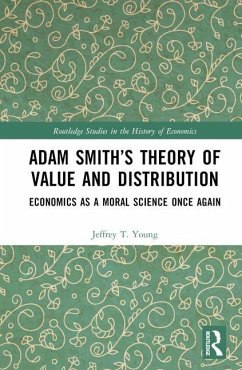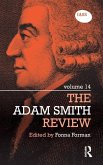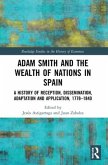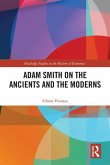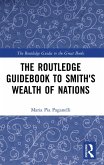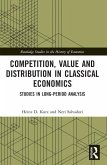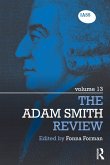Ever since the time of his early interpreters, beginning with David Hume, Adam Smith's theory of value has been the subject of confusion and misunderstanding-including a controversy which still rages over whether Smith held a labour theory of value, and, if so, whether he held to it throughout Wealth of Nations, or if it was confined to the "Early and Rude State"? This book provides a close reading of Smith's key text, and also incorporates material from the other parts of Smith's oeuvre, especially from The Theory of Moral Sentiments, to yield original and important insights into Smith's theory of value. The book operates on the assumption that Smith is proposing relatively simple ideas about price and takes a conventional view that simple Supply and Demand models can illuminate, clearly and consistently with his text, his theory of price. Combining these elements, the book argues that, contra Marx, Smith does not have a labour theory of value at all, understood as a theory of the determination of the relative price structure. Instead, Smith is placed squarely in the supply and demand, general equilibrium framework and the claim that he is part of a "surplus tradition", which receives its highest treatment in the work of Piero Sraffa, is refuted. This book will be of particular interest to Adam Smith specialists, historians of economic thought, and research economists who have an interest in Smith.
Jeffrey Young covers the complex and real problems of property, labour theory of value and distribution in Book I of Wealth of Nations, always bearing in mind that Smith´s economics is a moral science. As the author had already argued, 'unlike old soldiers, old Adam Smith problems neither die nor fade away' (Young, 1997, p. 203). This book about the classic old problems is a healthy reminder that Smith´s challenges are still relevant. It is a great present for Adam Smith´s 300th birthday.
Leonidas Montes, Centro de Estudios Públicos and Universidad Adolfo Ibáñez, Chile
The doyen of Smith studies, Jeffrey Young, returns to Smith's key concepts with fresh eyes to illuminate the key building blocks of Smith's moral science. As Young notes this approach, which treats human agents as social/moral persons, is being revived as Humanomics by Vernon Smith and Bart Wilson (themselves inspired by Adam Smith.)
In this very readible monograph, Young dispells a lot of misconceptions about the core of Smith economic analysis by using the toolkit modern economics and, thereby, making Smith simultaneously familiar and fresh again.
Eric Schliesser, Professor, Political Theory, Department of Political Science, University of Amsterdam,
Jeff Young devoted a career to clarifying the political economy and social philosophy of Adam Smith with great skill and insight. This work represents a fundamental contribution to Smith scholarship and the field of history of economic analysis in general. It is required reading for all in the field.
Peter Boettke, University Professor of Economics & Philosophy, George Mason University
Young has settled definitively that Smith, unlike his self-described follower Marx, did not have a labor theory of value---that source of endless scientific and ethical error. The book overturns a leading myth among many about the Blessed Smith, that he was an advocate for selfishness, for example, or that he was a conservative, or a materialist, or a statist, or simply muddled.
Deirdre Nansen McCloskey, author of Why Liberalism Works.
Leonidas Montes, Centro de Estudios Públicos and Universidad Adolfo Ibáñez, Chile
The doyen of Smith studies, Jeffrey Young, returns to Smith's key concepts with fresh eyes to illuminate the key building blocks of Smith's moral science. As Young notes this approach, which treats human agents as social/moral persons, is being revived as Humanomics by Vernon Smith and Bart Wilson (themselves inspired by Adam Smith.)
In this very readible monograph, Young dispells a lot of misconceptions about the core of Smith economic analysis by using the toolkit modern economics and, thereby, making Smith simultaneously familiar and fresh again.
Eric Schliesser, Professor, Political Theory, Department of Political Science, University of Amsterdam,
Jeff Young devoted a career to clarifying the political economy and social philosophy of Adam Smith with great skill and insight. This work represents a fundamental contribution to Smith scholarship and the field of history of economic analysis in general. It is required reading for all in the field.
Peter Boettke, University Professor of Economics & Philosophy, George Mason University
Young has settled definitively that Smith, unlike his self-described follower Marx, did not have a labor theory of value---that source of endless scientific and ethical error. The book overturns a leading myth among many about the Blessed Smith, that he was an advocate for selfishness, for example, or that he was a conservative, or a materialist, or a statist, or simply muddled.
Deirdre Nansen McCloskey, author of Why Liberalism Works.

